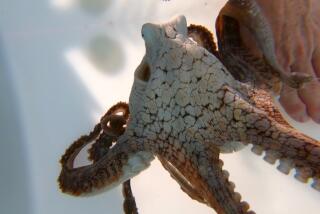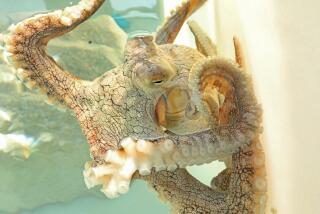Live octopus? Animal activists want it off the menu
- Share via
Writhing octopus, prawns and other seafood have been plated at Los Angeles restaurants for many years. The Japanese and Korean dishes are openly advertised, reviewed by food critics and patrons, and posted on YouTube.
Animal rights activists say it’s time to take the dish off the table.
People for the Ethical Treatment of Animals on Tuesday released video of squirming octopus tentacles and twitching shrimp heads served up at Korean restaurants in Los Angeles and New York.
Fair warning: It’s not easy viewing for the squeamish.
Live slaughter of seafood appears to fall in a loophole in California law, according to PETA. Animals slaughtered for eating are not covered in the Cruelty to Animals statute, and food regulations allow restaurants to keep live seafood.
PETA activists went to several restaurants in Los Angeles in September, and chronicled octopus, lobster and shrimp being served while still moving.
The group hopes consumers will pressure legislators to ban the practice. But the organization hinted it may not stop there. “We’re taking no other options off the table until live animals themselves are taken off the table,” said spokesman Ben Williamson.
Owners of Los Angeles restaurants where PETA said the live seafood was served were not available for comment Monday.
At the heart of the campaign is San Nag-jik, a Korean dish of writhing octopus tentacles seasoned with sesame, which is served in more than a half-dozen restaurants in Koreatown, according to Yelp. PETA chronicled the experience in two.
Celebrity chef Anthony Bourdain dined on the dish in Queens, N.Y., for an episode of his “No Reservations” TV series.
The Guardian caught flak when one of its writers dined on live seafood and wrote a story about it. The British newspaper actually has written about the dining experience twice. Writer Joe Warwick said that twitching prawns are something of an epicurean circus act — the movement of their antennae is caused by vestigial electrical impulses after they are essentially brain dead.
In 2002, Former Los Angeles Times Food Editor Russ Parsons made the rounds of restaurants serving live seafood, from Koreatown to Santa Monica, and deemed it “chewier and perhaps not quite as flavorful, and cut a little thicker” than sashimi.
How much different was it than eating raw oysters, which presumably are alive, Parsons asked.
“In my professional opinion, an octopus whose arms are cut off is likely experiencing pain and suffering.”
— Jennifer Mather, animal behavior researcher, University of Lethbridge, Canada
Robert Elwood, an animal behavior scientist at Queens University, Belfast, who has studied how animals register pain, is convinced that the reactions of decapods such as prawns, shrimp and lobster “fulfill the criteria of pain” as humans know it.
Decapods “show a high motivation to escape noxious stimuli, respond in ways that are conclusively not mere reflexes, have strong physiological stress responses, show symptoms of anxiety after negative treatments, and have long-term memory of negative experiences,” he said in a statement issued by PETA.
An octopus is no different, added Jennifer Mather, a biologist and psychologist at the University of Lethbridge, who has studied the animals’ reaction to negative stimuli. Octopuses learn from their injuries and plan reactions to them, Mather concluded.
“In my professional opinion, an octopus whose arms are cut off is likely experiencing pain and suffering,” Mather said. “This suffering is almost certainly prolonged when the animal is deliberately kept alive until all of the arms have been ordered.”
Octopuses are considered to be quite intelligent, and their seemingly well-thought-out exploits, including complicated escapes, have been chronicled widely.
In 2009, an octopus at the Santa Monica Pier Aquarium managed to disassemble a water recycling valve and redirect a tube to spray outside the tank, flooding the facility.
Follow me: @LATgeoffmohan
ALSO
Here’s evidence Snapchat Spectacles are headed to Texas and Oregon
Column: Trump embraces the cool part of Obamacare — but not the part that makes it work
Wanda Group to invest $15 billion to compete with Disney in China
More to Read
Inside the business of entertainment
The Wide Shot brings you news, analysis and insights on everything from streaming wars to production — and what it all means for the future.
You may occasionally receive promotional content from the Los Angeles Times.











